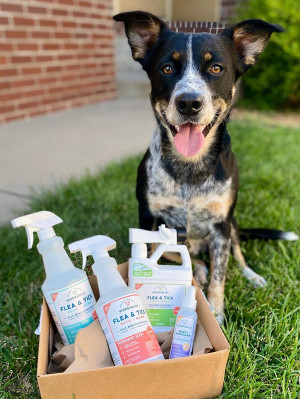Mosquito Bites and Dogs: How to Treat and Prevent Them
Everything you need to know to keep them healthy.

Share Article
In This Article
Do Mosquitoes Bite Dogs?opens in new tab What Does a Mosquito Bite Look Like on a Dog? Are Mosquito Bites on Dogs Dangerous? How to Treat a Mosquito Bite When Your Dog Is Bitten How to Prevent Mosquito Bites on Your Dog When to Seek Veterinary Help
Most of us wait all winter long, looking forward to the arrival of warm weather. Swimming, hiking, vacations, barbecues – there’s so much we like to do outside. In our anticipation, we tend to forget the negatives associated with warm weather, including insects such as mosquitoes.
You may think of mosquitoes as a human annoyance, but they target dogs as well. What’s more, mosquito bites are not just a nuisance causing discomfort or allergic reactions for your dog, but they also carry serious diseases. In this guide, we will look more closely at how mosquito bites affect dogs, how to treat them, and how to provide the best prevention possible.
Do mosquitoes bite dogs?
Yes, mosquitoes bite dogs; they are attracted to dogs just as they are to people. Dogs are often targets because they spend so much time outdoors, especially during dawn and dusk when mosquitoes are most active. Mosquitoes find us and our canine companions through the carbon dioxide that we exhale, our body heat, and scents. They have unique mouthparts that pierce our skin and feed on blood. Dogs with short fur or thin skin are particularly at risk.

What does a mosquito bite look like on a dog?
If your dog has a small, red, raised, and swollen bump on their skin, they may have a mosquito bite. Your pup may also scratch, lick, or chew on the area.
Flea bites vs mosquito bites
Sometimes, it’s difficult to tell the difference between flea and mosquito bites. The best way is their appearance. Mosquito bites are usually single, solitary bumps you see after your dog has been outdoors while flea bites occur in a cluster, usually on the hind end, belly, and groin, and they tend to increase in number over time.
Fleas usually leave small black specks called “flea dirt” on your dog’s skin or areas where they sit. Mosquitoes do not leave anything visible where they’ve been.
Are mosquito bites on dogs dangerous?
Most of the time, a mosquito bite will be irritated and itchy, but not cause further harm. However, mosquitoes sometimes carry serious diseases that can make your dog very ill.
Can dogs get sick from mosquito bites?
Yes, dogs can become sick from mosquito bites. Mosquitoes are carriers of several dangerous diseases that can make your dog very ill. Also, dogs can be allergic to mosquito saliva, become extremely itchy, and break out in hives.
Diseases that mosquitoes carry
Here are some diseases mosquitoes can transmit to dogs:
Heartworm disease: You’ve probably heard of heartworm disease. It’s one of the most serious diseases a mosquito can carry. Mosquitoes are the primary vectors of heartworm larvae, which mature into worms living in a dog’s heart and lungs. Heartworm disease can lead to serious organ damage and, if left untreated, can cause death.
West Nile virus: Dogs can also contract West Nile virus from mosquitoes, although it’s more common in birds and humans. Most dogs will not develop symptoms, although some may have neurological problems.
Eastern equine encephalitis (EEE) is a very rare virus that can cause neurological disease in dogs.
Other viral infections: Other mosquito-borne diseases, such as dog malaria, are very rare but exist in some parts of the world.
Preventing mosquito bites isn't just about helping an itchy dog but also about protecting their health and even life.
How to treat a mosquito bite when your dog is bitten
You know from personal experience how miserable a mosquito bite can make you. It also bothers your dog; if scratched too vigorously, it can break the skin and lead to an infection. It’s important to try to decrease the licking and scratching. Here’s how to treat mosquito bites on dogs:
Clean the area: Use mild soap and warm water to gently clean the site of the bite to remove irritants and help reduce the risk of infection.
Apply a cold compress: Use a clean cloth with cold water or an ice pack wrapped in a towel to reduce swelling and soothe itching. Apply for about five to 10 minutes.
Topical treatments: Hydrocortisone cream is a great aid in fighting the itch and swelling. There are other over-the-counter products formulated for dogs to help reduce itching. Always consult your vet before applying any human products.
Prevent licking and scratching: Although dogs don’t like it, they may need to wear Elizabethan collars (cones) to prevent excessive scratching.
Monitor the bite: Keep a close eye on the bite, watching for the typical signs of infection, such as swelling, fever, redness, and discharge.
If the bite site worsens or your dog seems uncomfortable, contact your veterinarian for further advice.
How to prevent mosquito bites on your dog
Prevention is crucial, especially since mosquito bites can lead to serious illnesses. Here are effective strategies:
Mosquitoes are most active during dawn and dusk, so keep your pup indoors during those times.
Never use human mosquito repellents, especially ones containing DEET, on dogs. Instead, use veterinarian-approved repellents specifically formulated for dogs.
Install screens: Screens on all your windows and doors will help keep mosquitoes out of your home.
Standing water around your house invites mosquitoes to lay their eggs. To prevent this, empty birdbaths, plant saucers, and anything else containing water outside your home.
Protective clothing: In some cases, a lightweight shirt or vest can provide an added layer of physical protection for your dog.
Heartworm prevention: Consistent use of a veterinarian-prescribed heartworm preventive medication is essential and the best defense against this mosquito-borne disease. It should be used year-round due to the fluctuations in temperature.
Environmental controls: Use mosquito yard sprays that are pet-safe or natural repellents such as lavender plants or citronella in outdoor areas to help deter mosquitoes.
The combination of measures taken indoors, on your dog, and outdoors can help tremendously to keep the annoying mosquitoes away. However, don’t forget to use a heartworm preventative year-round. It’s not possible to keep every single mosquito away.
When to seek veterinary help
When your dog gets a mosquito bite, it will most likely heal on its own or with your assistance. However, there can come a time when you need veterinary help. This includes if:
The swelling gets worse
Hives appear or your pup has difficulty breathing, vomiting, or collapses. These can be signs of a very severe allergic reaction.
Signs of infection develop such as increased redness, pus, or the site feeling warm.
Your dog loses their appetite or is very lethargic. This can suggest a mosquito-borne illness such as heartworm could be developing.
As always, early detection leads to earlier treatment and a better outcome.
Bottom line
Mosquitoes aren’t just an annoyance to dogs; they can be a serious danger to their health. You can usually treat minor irritation at home, but if there are signs of an allergic reaction or infection, it’s time to call the vet. The key to keeping mosquitoes from ruining your dog’s summer is to treat bites immediately, use mosquito control in and outside your house, and use veterinarian-recommended heartworm prevention on your pup year-round.
References:
Fankhauser, Becky, et al. “Repellent and Insecticidal Efficacy of a New Combination of Fipronil and Permethrin against Three Mosquito Species (Aedes Albopictus, Aedes Aegypti and Culex Pipiens) on Dogs.” Parasites & Vectors, vol. 8, no. 1, 30 Jan. 2015, https://parasitesandvectors.biomedcentral.com/articles/10.1186/s13071-015-0691-yopens in new tab
Hoffman, Donald R. “Allergy to Biting Insects.” Clinical Reviews in Allergy, vol. 5, no. 2, May 1987, pp. 177–190, https://link.springer.com/article/10.1007/BF02991206opens in new tab
McCall, John W., et al. “Shifting the Paradigm in Dirofilaria Immitis Prevention: Blocking Transmission from Mosquitoes to Dogs Using Repellents/Insecticides and Macrocyclic Lactone Prevention as Part of a Multimodal Approach.” Parasites & Vectors, vol. 10, no. S2, Nov. 2017, https://parasitesandvectors.biomedcentral.com/articles/10.1186/s13071-017-2438-4opens in new tab
Tahir, Djamel, et al. “Aedes (Stegomyia) Aegypti Mosquito Bite Hypersensitivity in a Dog: A Case Report.”BMC Veterinary Research, vol. 16, no. 1, 23 Oct. 2020, https://bmcvetres.biomedcentral.com/articles/10.1186/s12917-020-02622-opens in new tab

Dr. Shelby Neely, DVM
Dr. Shelby Neely is a freelance writer and veterinarian who graduated from the University of Pennsylvania School of Veterinary Medicine and has practiced veterinary medicine for 30 years, specializing in small animals. Her work has appeared in Allivet, AsktheCatDoctor, WhiskerDocs, Ask the Cat Doctor Radio, Ask the Cat Doctor TV, and numerous other websites, brochures, newsletters, newspapers, and ebooks. In her spare time, Dr. Neely likes to spend time with her three children, two grandchildren, three cats, two grand-cats, and five grand-dogs.
Related articles
![A happy woman is lying on a bed, her dog smelling her face.]()
9 Diseases You Can (and Definitely Can’t) Catch From Your Dog
Here’s what you can scratch off your “Worry About This” list.
Can Humans Get Dogs Sick?
Think of the amount of tissues you’d need...
![Dog walking her owner down by the river.]()
Heartworm Is on the Rise in Cats and Dogs
Pet parents underestimate the risk of this serious condition, new survey reveals.
![Veterinarian checking large dog's skin and fur.]()
Vet-Recommended Flea-and-Tick Treatments
Learn what is best for your pet.
![Dog near a vegetable garden next to a basket full of a harvest]()
Tips on Dog-Safe Gardening
Garden organically, for the sake of both the planet and your dogs.
![Woman examining her small white dog's skin outside on a couch.]()
What to Do About Bug Bites on Your Dog
And how to help them get relief.







